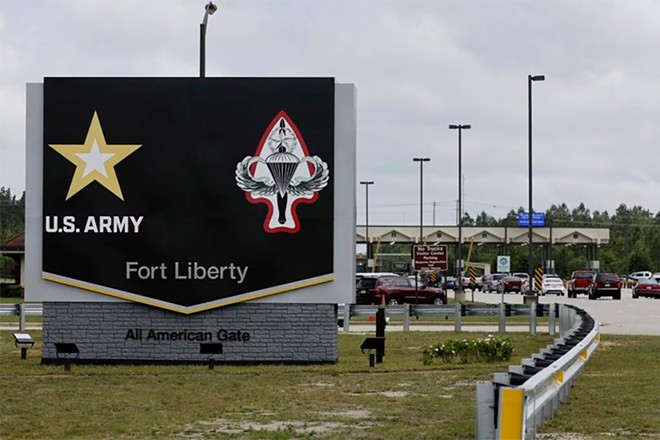
When I was in high school, my Grandma Wanda fought a battle with the American Legion to have a veteran's marker placed on the grave of her husband's grandfather.
Eventually, the Legion post relented and put a veteran's stone over John Beckerdite's earthly remains. What gave the veteran's organization pause is that John hadn't served in any branch of the United States Armed Forces. He fought for the Confederacy.
"Although he fought for the South, he fought for his country," Grandma wrote in a family history.
When she wrote that, I was about 14 years old. I thought it was nonsense then. And I think it even more so today. My ancestor didn't fight for his country, he betrayed it. And, no, he didn't battle for freedom, he fought for slavery.
When I made these points to Grandma, she wouldn't hear of it. She had bought into the myth of the Lost Cause.
I was thinking of that long-ago argument this past week, as the U.S. armed forces began renaming military bases that had originally been named after Confederate generals.
For example, Fort Bragg will become Fort Liberty. Fort Hood will become Fort Cavazos. Fort Benning will become Fort Moore. And Fort Gordon will become Fort Eisenhower.
Some traditionalists are hopping mad about the change. They say the Biden administration is erasing history.
Baloney.
The administration is eradicating the remnants of a fable.
It's the myth that the Southerners fought a noble fight for independence. They will tell you – with a straight face – the Civil War was fought not over slavery, but state's rights.
It's just not true. All 11 Southern states said in their individual articles of secession that they were departing the Union over the issue of slavery.
One Southern friend concedes that the South may have left the Union over slavery. But he adds the North didn't fight the war to end slavery.
Well, I guess you can ignore the Emancipation Proclamation or Abraham Lincoln's moral opposition to slavery, but what about this line from the "Battle of the Republic" that Union soldiers sang marching into battle: "As Christ died to make men holy, let us die to make men free?"
Whose freedom do you think they were dying for?
No one wants to believe their ancestors died and sacrificed for something as reprehensible as the right to own another human being. But men like Braxton Bragg, John Bell Hood, Henry Benning and John Brown Gordon did just that.
It's shameful that our nation named its military bases after these and other traitors. And make no mistake about it, these men betrayed their country. They took up arms against a nation that they once pledged to serve.
Worse yet, they did it in support of an issue as abhorrent as slavery.
My father spent a miserable few months at Fort Gordon, where he went through Army basic training during the Korean War. He never spoke well of his time as a draftee. There was no nostalgia directed toward his time in the service.
But I can't help but think he would be pleased that the base where he suffered is now named after the first person he supported for president – Dwight D. Eisenhower.
Unlike Gordon, who is believed to have headed the Georgia Ku Klux Klan, Eisenhower fought for individual liberty. He and his troops defeated Nazism and liberated concentration camps. While president, he sent the 101st Airborne to Little Rock, Arkansas, to force the integration of public schools.
Those are actions worthy of praise.
And no, Eisenhower wasn't perfect. He made mistakes. But the thrust of his life's work was moving the nation in the right direction.
Some will say that renaming the bases is rewriting history. That's silly. What we are rewriting is who we choose to honor in our history.
The bases got their names as part of a political compromise. As the Army was expanding during World War I, it wanted to establish training bases in the South. To get local buy-in, it allowed state legislatures to choose the names of the bases. Lawmakers – just 49 years after the Civil War – chose to name the bases after Confederate generals.
Please note, Southern African Americans couldn't vote during this era. They had no say over who was honored.
Illinoisans should be proud of our heritage. The two individuals most responsible for defeating secession and slavery – Abraham Lincoln and Ulysses S. Grant – both hailed from the Prairie State.
So why does the Civil War still divide us? The best answer is that we haven't come to terms with its causes. Race still divides our nation.
In 2017, we saw the deep divisions of the Civil War manifest themselves in Charlottesville, Virginia, where riots ensued after a statue of Robert E. Lee was to be taken down. Those who supported the statue remaining said it wasn't about race, but their heritage, which they contended was being marginalized.
But if it wasn't about race, why would neo-Nazis, Ku Klux Klan members and other white supremacists be there rioting?
We should be proud that our military has expunged the names of secessionists from their places of honor.
Scott Reeder, a staff writer for Illinois Times, can be reached at [email protected].






















